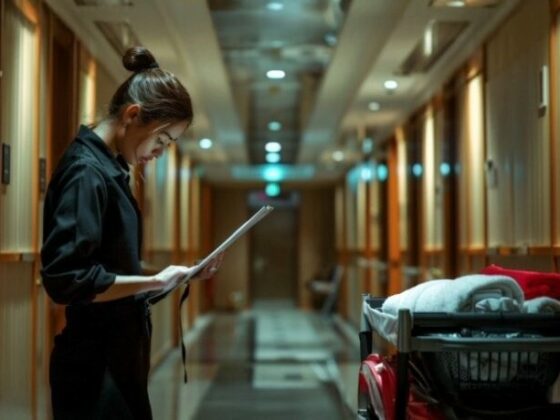
The hospitality industry, like much of the global economy, is facing an uncertain road ahead. From fluctuating tariffs and inflation to wavering consumer confidence and international travel slowdowns, macroeconomic forces are pressuring our sector in 2025. While the word “recession” remains speculative, the signs of a travel downturn are present – and hoteliers must prepare accordingly.
Some early signs:
- Moderate Growth: Projections for 2025 indicate a modest increase in RevPAR, with estimates ranging from 1.5% to 2%, according to CoStar.
- Rising Operational Costs: Insurance expenses for hotels have surged by 15.3% through October 2024, according to AHLA, with midscale and small economy hotels experiencing increases over 19.6%.
- Layoffs and Budget Cuts: Major travel companies, including Marriott International and Booking.com, announced layoffs and budget reductions late last year due to decreased leisure travel demand, according to Reuters.
As we speak with customers across the industry, one sentiment is consistent: Profitability is becoming harder to maintain through top-line revenue alone. The cost side of the equation is coming into sharper focus than ever before. Operators and owners are monitoring wage growth carefully, rethinking how much they spend on amenities, and increasingly exploring strategies to do more with less.
Moments like this, however, can also present opportunity. If we accept that economic cycles will ebb and flow, now is the time to future-proof our operations.
Our owners’ business model has been very challenged. We’ve experienced record revenue, but expenses have risen at a greater clip. So, we have to reverse that, and the only way is by utilizing technology to our advantage. If a storm comes, we’re not just fixing things in our own portfolio, we’re looking for opportunities. Mitch Patel, founder and CEO of Visions Hospitality Group, during the recent Hunter Hotel Investment Conference.
At Otelier, we believe the next phase of industry evolution will be defined by automation, centralization, and smarter data usage – so hotels can remain lean, responsive, and guest-centric no matter what comes next.
Cost Control Is the New Growth Strategy
During times of economic boom, it’s natural for operators to focus heavily on driving revenue – filling rooms, optimizing ADR, launching new amenities. But when guests aren’t traveling as frequently, those strategies can only take you so far. That’s why more hotel leaders are looking inward, shifting their focus to controlling what they can: labor, operational efficiency, and back-office processes.
Labor in particular remains one of the most persistent pain points. Wages continue to rise and the competition for talent remains fierce. Many operators are realizing that the answer isn’t necessarily to staff up, but rather to equip their existing teams with tools that help them work smarter.
For example, automating night audit processes or recurring journal entries can save hundreds of hours each month across a portfolio. Centralizing accounting or finance tasks at the regional or corporate level can dramatically reduce the workload at the property. These changes don’t just cut costs – they free up general managers and on-site teams to focus on what really matters: focusing on guest experience.
The Path to Leaner, Smarter Operations
Let’s be clear: automating hotel operations does not mean removing the human touch from hospitality. What it means is eliminating the tasks that don’t add value to the guest, and that often burden staff with manual work – things like compiling reports, chasing down invoices, or reconciling accounts across systems that don’t talk to each other.
More and more operators are embracing a future where leaner hotel teams are supported by centralized functions and digital tools. In some cases, portfolios of 25, 50, or even 100 hotels can be run with minimal on-property administrative overhead, thanks to shared data centers and intelligent software platforms. Housekeeping may be outsourced, check-in may be fully automated – but the moments that matter most to the guest remain thoughtfully designed and intentionally human.
Of course, how far a property leans into automation will depend on its market segment. A select-service or extended-stay hotel may benefit tremendously from a touchless check-in process and centralized accounting. Meanwhile, a luxury resort should retain and even elevate the in-person welcome – because in those environments, the greeting at the front desk is part of the brand promise.
A Masterclass in Efficiency: MCR Hotels
One company that’s taken this message to heart is MCR Hotels, one of the largest hotel owner-operators in the United States. With around 150 hotels across 37 states, MCR is known for its strategic focus on ownership, operations, and technology – and its ability to move quickly when the industry shifts.
MCR has streamlined its night audit and reporting workflows across its entire portfolio to reduce the amount of time property teams spend on manual, repetitive tasks, and give leadership real-time visibility into operations.
The results have been striking. MCR stores nearly 2,000 reports per day in Otelier, on average, with 99% report compliance across its portfolio. Across its hotels, the company saves an average of 150 work hours per month, which has allowed teams to shift their focus back to service – not spreadsheets. For internal and government audits, the company can now provide digital access to reports in minutes, instead of spending weeks digging through archived paperwork.
Partnering with Otelier has solved a pretty large problem in terms of getting the right reports to the right people every day from our properties
, Kyle McCaig, MCR’s Director of Technology Service Delivery, told us recently. Not removing the human nature of it, but improving the processes and allowing our account managers and our accountants to get the data and then do their actual job rather than spend their entire day chasing the data
.
By centralizing reports and removing back-office friction, MCR has built a more resilient, agile operation that can weather market fluctuations while staying laser-focused on guest satisfaction.
Resilience Requires Reinvention
Recession or not, the message is clear: the hotel industry is entering a period of operational reinvention. For those willing to rethink traditional models, this can be a time of meaningful transformation. Automating repetitive tasks, centralizing functions, and leveraging data in new ways can help operators weather short-term uncertainty – and emerge stronger and more agile on the other side.
At Otelier, we’ve built our solutions with this reality in mind. From audit automation to predictive business intelligence, our tools are designed to improve margins, simplify operations, and give hotel teams more time to focus on what matters most.
The future of hotel operations won’t be defined by fear of what’s to come, but by a proactive commitment to innovation. In today’s environment, that’s not just smart business – it’s survival.
About Otelier
Otelier is a hospitality performance optimization platform that puts data and efficiency at the heart of hotel operations. The solutions enable hotel owners, operators and brands to run world-class operations by automating back-office tasks, improving budget and forecast accuracy, and gaining real-time insights into property and portfolio performance. Otelier serves more than 10,000 hotels across the globe with DigiAudit, DigiPay and Rec to streamline back-office workflows; TruePlan for more accurate budgets and forecasts; and IntelliSight to turn comprehensive data sets into actionable insights. For more information, visit otelier.io.
Jason Freed
Hospitality Data Evangelist
+1 330 221 6068
Otelier (formerly myDigitalOffice)







